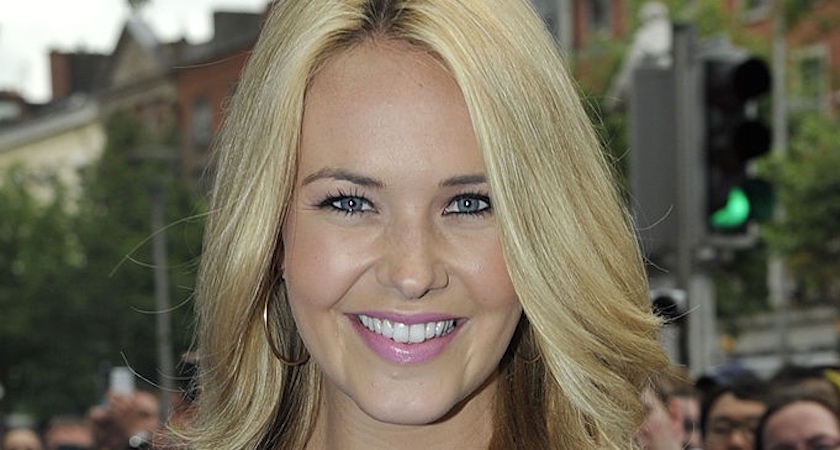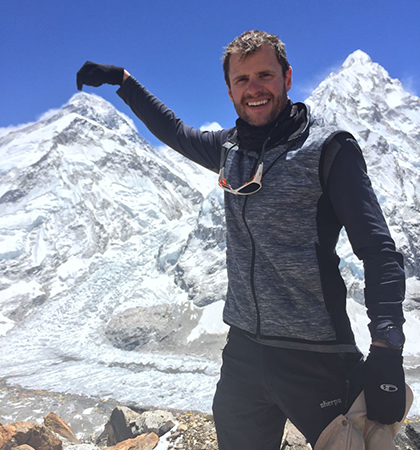AN IRISHMAN has said he could 'see the death' in climbers' faces as he became the first Co. Clare man to reach Everest's summit.
John Burke, 38, reached the summit of Everest on May 16 after a three day climb, and said while the trip was a 'dream', it was not without its terrors.
Mr Burke, a hotelier who owns the Armada Spanish Point Hotel in Co. Clare, is married to Irish actress Aoibhin Garrihy.
 John Burke climbed Everest to raise awareness for a young people's charity he set up with his actress wife Aoibhin Garrihy (Photo by Clodagh Kilcoyne/Getty Images for Paramount Pictures International)
John Burke climbed Everest to raise awareness for a young people's charity he set up with his actress wife Aoibhin Garrihy (Photo by Clodagh Kilcoyne/Getty Images for Paramount Pictures International)Speaking from Everest Base Camp following the successful assault on the mountain on his first attempt, John Burke said that he could see the fear of death in climbers’ faces as they witnessed corpses of those who had tragically lost their lives there previously.
“The final night was hell on earth, as I witnessed casualties of the mountain first hand, passing the first body soon after setting off.
"I could see the fear of death in the faces of some people close to me.
"At one stage I had to intervene with a Romanian who seemed to have summit fever, an inability to make a rational decision about turning back," he said.
While the mountaineer says he never felt beyond his physical limits, he did feel the extreme conditions take their toll on his health, and felt his body 'consuming itself.'
“It’s estimated that on the summit night alone we burn in the region of 20,000 calories.
"I consumed no more than 300 and had nausea issues for three days and it effectively shut down my food consumption and liquids too.
"You end up feeling like your body is consuming itself, which it does anyway in the death zone above 8000 metres."
While some would think the ascent is the toughest part of the Everest climb, Mr Burke said the descent can actually prove more fatal.
“The descent is actually where most accidents happen the most and this is where you really have to tune into the max. I lost concentration a bit on a narrow technical section close to the top.
 John Burke during his ascent on Everest.
John Burke during his ascent on Everest."It was about a foot wide but only a drop of 15 feet to the next ledge, but I thought if I slip here and break any bone in my leg, that’s it, I'm dead.
"As much as the Sherpas would want to do for you, there’s no real rescue opportunity all the way up there, so that small slip would essentially be fatal.
"The margins are that tight between life and death up there and I had enough focus left to tune in think of that first body we passed on the way up and what that family must have gone through.
“It's a crazy place to be, surrounded by the most amazing and most ferocious scenery and yet to be that close to tragedy.”
The Irishman said that he took on the challenge to fulfil a personal dream.
But he also took on the climb to raise awareness and funds for the charity, Elevate, which he and his wife established to promote wellbeing among young people and encouragement them to reach their potential.
“I’ve been 10 years dreaming of following in the footsteps of some great Irish adventures, people like Pat Falvey, Ger McDonnell and so many more.
"Their stories have inspired me to take to the hills and test just how far my body and mind can go,” he said.
“After preparing over that time on mountains around the world, I figured it was time to attempt the big one. The final plan was 12 months in the making.
"I treated Everest like a work project; finding the best people to work with, breaking down the action plan into segments to enable me get to the summit of the world," he added.
"I was fully aware of the risks but focussed only on controlling those things I could control."
Mr Burke's wife Aoibhin said: “It’s been a roller coaster few weeks.
"We focused on the positive all the time but we were aware at the same time of the serious risks involved in climbing Everest.
"I was of course anxious but also extremely excited for him, and I’m so proud of him - it’s an incredible achievement.
"Only 50 per cent who try succeed but, more than anything, thank God he’s making it back safely," she added.

